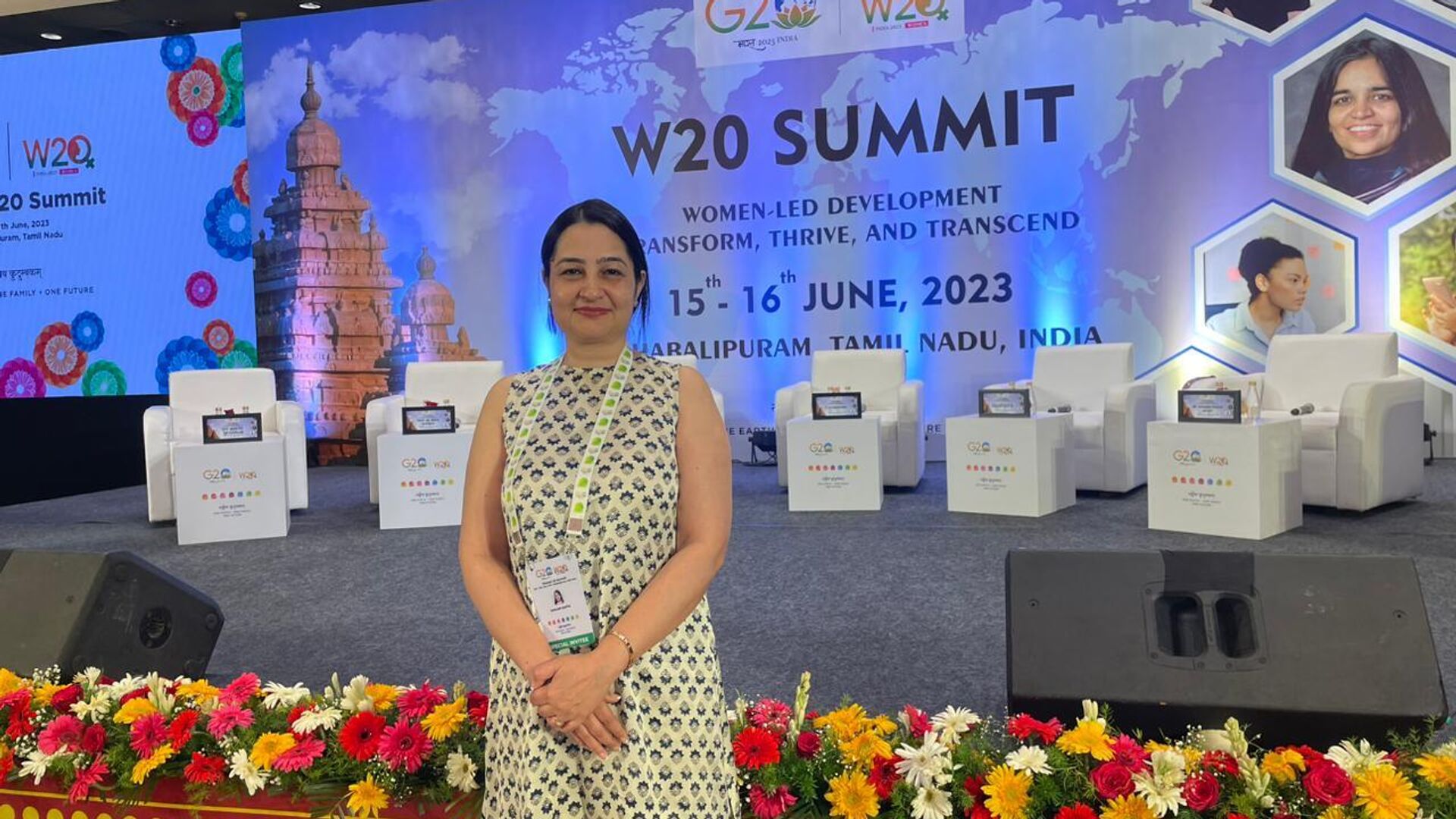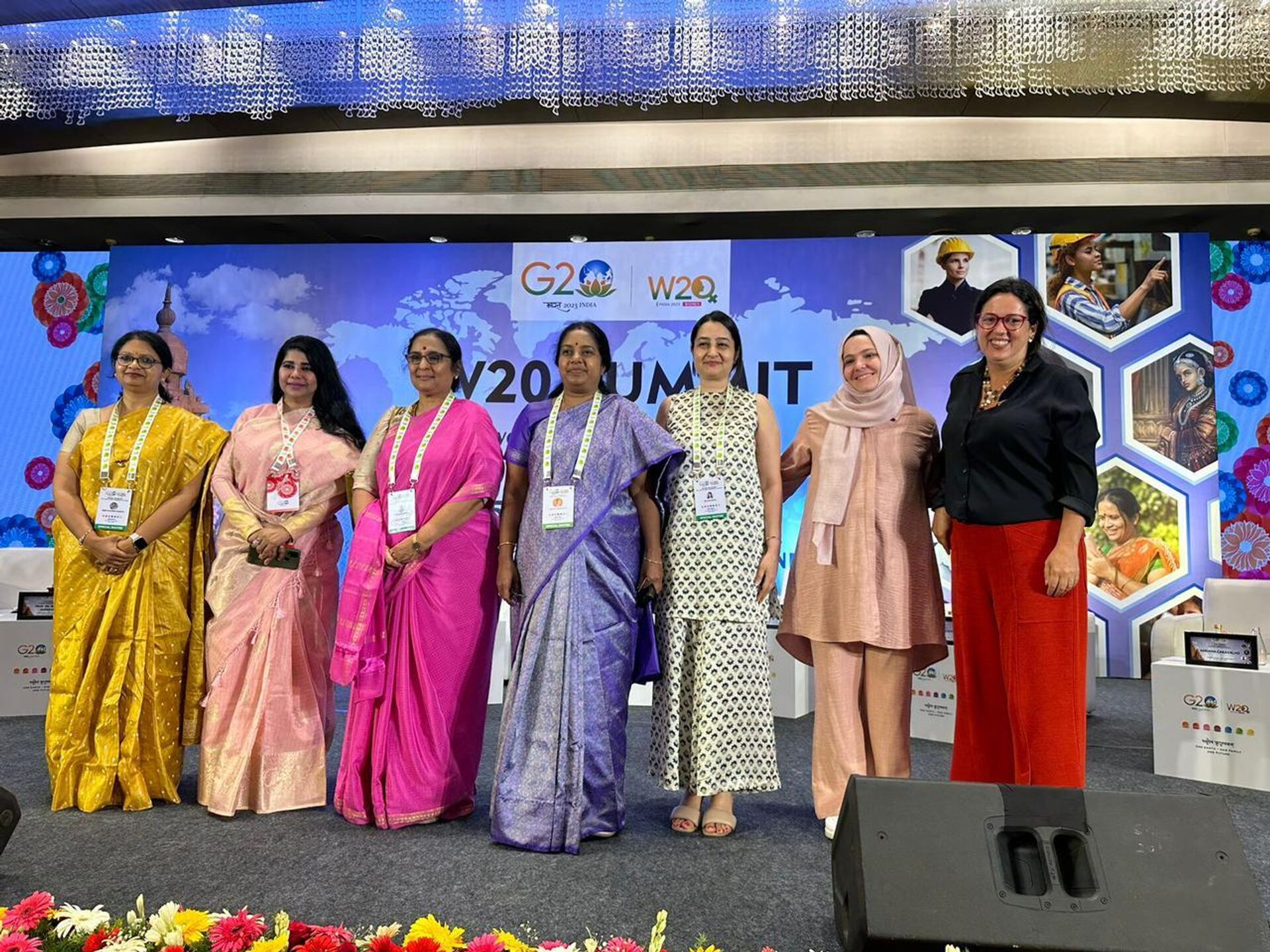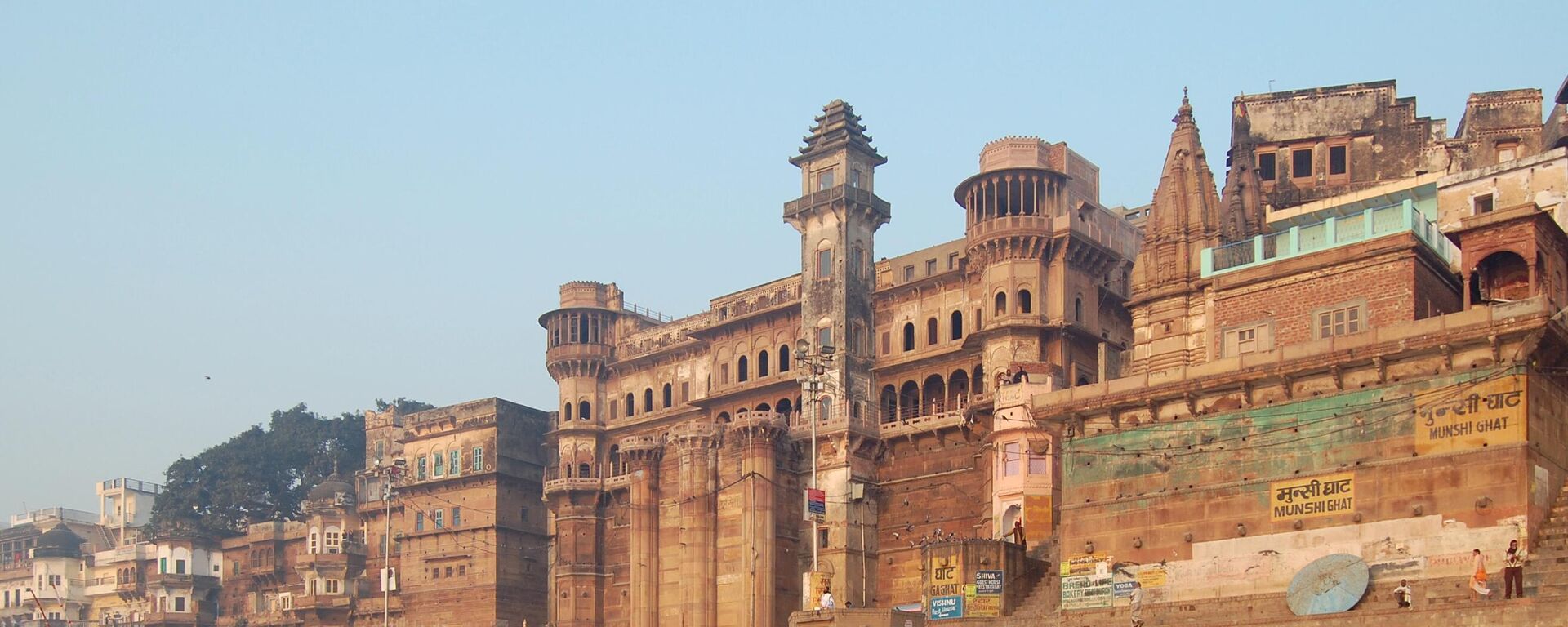https://sputniknews.in/20230617/companies-should-be-ranked-on-how-many-women-they-employ-says-female-shipping-boss-2526152.html
Companies Should Be Ranked On How Many Women They Employ, Says Female Shipping Boss
Companies Should Be Ranked On How Many Women They Employ, Says Female Shipping Boss
Sputnik India
The maritime sector is still largely dominated by men, with women making up a mere 1.2% of the world's sailors, and in India, that percentage further drops to 0.5 percent.
2023-06-17T08:30+0530
2023-06-17T08:30+0530
2023-06-17T08:30+0530
sputnik exclusives
india
maritime security
maritime dispute
women's rights
women empowerment
women's education
gender discrimination
g-20
https://cdn1.img.sputniknews.in/img/07e7/06/10/2526862_0:120:1280:840_1920x0_80_0_0_f789b8f39509b290a7bdc41f6c13397b.jpg
Over the past few decades, women’s involvement in both white-collar and blue-collar employment has continued to rise. A number of women are now working in the IT and other knowledge-intensive sectors and in India, the proportion of women working in blue-collar jobs has risen by 26 percent in only the past two years.However, the maritime sector is still largely dominated by men, with women making up a mere 1.2 percent of the world's sailors, although in India, the percentage is 0.5 percent. This indicates that policies and initiatives are needed to support sex diversity in the marine sector.Sputnik spoke with Sanjam Sahi Gupta, founder of Women's International Shipping and Trading Association (WISTA) and one of the panelists addressing the W-20, to discuss her career in shipping and the challenges and sex stereotypes in the sector.Other roles include being a director of Sitara Shipping Ltd and Astral Freight Forwarders [Pvt] Ltd, and heads a non-vessel operating common carrier business for the Indian Subcontinent and Middle East business. Gupta is also an executive board member of the World Maritime University.Sputnik: Female empowerment tops the G20's agenda this year. What are the most pressing issues women still face today?Gupta: My first focus is to bring more women into the workforce and then to have more women in leadership roles. We cannot change the narrative if fewer women are in leadership positions. If there are not enough women in leadership positions, there will not be enough role models for young girls.Women around the world need to know they can break the barriers. I have learnt that if you need to change an organisation, you need to have at least 30 percent of people from that subgroup who can at least explain their problems and challenges.Women are unlocking their potential through all sorts of empowerment and mentorship as a result of which, they are gradually having a powerful effect on India's corporate landscape.Sputnik: As the shipping industry is still considered a male domain, how would you handle that sex stereotype?Gupta: There are two roles that women can increasingly play in shipping - at-sea seafarers and at-shore positions.Traditionally maritime has been a male-dominated industry, but times are changing. We now have more female role models at sea and onshore, but we are still a long way to go. What we need to do is continue to drive campaigns to smash stereotypes, we need to have more sensitivity programmes and also more leadership training for women.When I face that stereotype, I believe in defining myself as a maritime professional instead of a woman in maritime.Sputnik: You founded the Women's International Shipping and Trading Association (WISTA) in India. Can you explain why you felt there was a need to start something female-specific in the maritime industry?Gupta: It’s been 10 years since I launched WISTA in India. At that time, there were very few women in the forefront, and no maritime platform for women. At meetings and conferences, the speakers would address the gathering as "Gentlemen" regardless of the fact that there was a handful of women in the room. Today I’m happy to say that WISTA is the voice for women in maritime in India. They are recognised, their contributions acknowledged, and they provide a support system to women in shipping.Sputnik: How do you expect to build a platform for your industry, and what are your concerns?Gupta: Building on WISTA, I have launched Maritime SheEO, intending to create women leaders in the maritime industry. With funding from the UN body in maritime, the International Maritime Organisation, we are running our leadership accelerator programme for women in maritime. Furthermore, we need hard data to ensure that the decision-makers understand how far we have yet to go. In this regard, we have researched the business case for diversity in Indian shipping.My concerns are that although chief executives acknowledge the importance of diversity, they aren’t doing enough, aren’t setting targets, and aren’t declaring their sex ratios. We should be ranking companies on their sex ratios and policies towards women, and companies should be made to declare this data as well.We need to stop working in silos and start working with all hands on deck.
https://sputniknews.in/20230612/g20-india-and-brazil-call-out-richer-nations-for-cherry-picking-development-goals-2442240.html
india
Sputnik India
feedback.hindi@sputniknews.com
+74956456601
MIA „Rossiya Segodnya“
2023
Deexa Khanduri
https://cdn1.img.sputniknews.in/img/07e6/0c/13/138923_52:0:533:481_100x100_80_0_0_cadf23d341691fc65ff2b22fd1afe584.jpg
Deexa Khanduri
https://cdn1.img.sputniknews.in/img/07e6/0c/13/138923_52:0:533:481_100x100_80_0_0_cadf23d341691fc65ff2b22fd1afe584.jpg
News
en_IN
Sputnik India
feedback.hindi@sputniknews.com
+74956456601
MIA „Rossiya Segodnya“
Sputnik India
feedback.hindi@sputniknews.com
+74956456601
MIA „Rossiya Segodnya“
Deexa Khanduri
https://cdn1.img.sputniknews.in/img/07e6/0c/13/138923_52:0:533:481_100x100_80_0_0_cadf23d341691fc65ff2b22fd1afe584.jpg
w-20, women-20 summit, women-led development- transform, thrive and transcend, tamil nadu|, mahabalipuram city, white-collar, blue-collar sectors, gender diversity, sanjom singh gupta, women's international shipping and trading association, wista, maritime sheeo, maritime industry,
w-20, women-20 summit, women-led development- transform, thrive and transcend, tamil nadu|, mahabalipuram city, white-collar, blue-collar sectors, gender diversity, sanjom singh gupta, women's international shipping and trading association, wista, maritime sheeo, maritime industry,
Companies Should Be Ranked On How Many Women They Employ, Says Female Shipping Boss
Deexa Khanduri
Sputnik correspondent
Exclusive
As part of its presidency of the G20, India is hosting the Women-20 summit this week from 14 to 16 June. The theme of this year's two-day event in Tamil Nadu’s city Mahabalipuram is ‘Women-Led Development - Transform, Thrive and Transcend’.
Over the past few decades,
women’s involvement in both white-collar and blue-collar employment has continued to rise. A number of women are now working in the IT and other knowledge-intensive sectors and in India, the proportion of women working in blue-collar jobs has risen by 26 percent in only the past two years.
However, the maritime sector is still largely dominated by men, with women making up a mere 1.2 percent of the world's sailors, although in India, the percentage is 0.5 percent. This indicates that policies and initiatives are needed to support sex diversity in the marine sector.
Sputnik spoke with Sanjam Sahi Gupta, founder of Women's International Shipping and Trading Association (WISTA) and one of the panelists addressing the W-20, to discuss her career in shipping and the challenges and sex stereotypes in the sector.
Other roles include being a director of Sitara Shipping Ltd and Astral Freight Forwarders [Pvt] Ltd, and heads a non-vessel operating common carrier business for the
Indian Subcontinent and Middle East business. Gupta is also an executive board member of the World Maritime University.
Sputnik: Female empowerment tops the G20's agenda this year. What are the most pressing issues women still face today?
Gupta: My first focus is to bring more women into the workforce and then to have more women in leadership roles. We cannot change the narrative if fewer women are in leadership positions. If there are not enough women in leadership positions, there will not be enough role models for young girls.
Women around the world need to know they can
break the barriers. I have learnt that if you need to change an organisation, you need to have at least 30 percent of people from that subgroup who can at least explain their problems and challenges.
Women are unlocking their potential through all sorts of empowerment and mentorship as a result of which, they are gradually having a powerful effect on India's corporate landscape.
Sputnik: As the shipping industry is still considered a male domain, how would you handle that sex stereotype?
Gupta: There are two roles that women can increasingly play in shipping - at-sea seafarers and at-shore positions.
Traditionally maritime has been a male-dominated industry, but times are changing. We now have more female role models at sea and onshore, but we are still a long way to go. What we need to do is continue to drive campaigns to smash stereotypes, we need to have more sensitivity programmes and also more leadership training for women.
When I face that stereotype, I believe in defining myself as a maritime professional instead of a woman in maritime.
Sputnik: You founded the Women's International Shipping and Trading Association (WISTA) in India. Can you explain why you felt there was a need to start something female-specific in the maritime industry?
Gupta: It’s been 10 years since I launched WISTA in India. At that time, there were very few women in the forefront, and no maritime platform for women. At meetings and conferences, the speakers would address the gathering as "Gentlemen" regardless of the fact that there was a handful of women in the room. Today I’m happy to say that WISTA is the voice for women in maritime in India. They are recognised, their contributions acknowledged, and they provide a support system to women in shipping.
Sputnik: How do you expect to build a platform for your industry, and what are your concerns?
Gupta: Building on WISTA, I have launched Maritime SheEO, intending to create women leaders in the maritime industry. With funding from the UN body in maritime, the International Maritime Organisation, we are running our leadership accelerator programme for women in maritime. Furthermore, we need hard data to ensure that the decision-makers understand how far we have yet to go. In this regard, we have researched the business case for diversity in Indian shipping.
My concerns are that although chief executives acknowledge the importance of diversity, they aren’t doing enough, aren’t setting targets, and aren’t declaring their sex ratios. We should be ranking companies on their sex ratios and policies towards women, and companies should be made to declare this data as well.
We need to stop working in silos and start working with all hands on deck.




